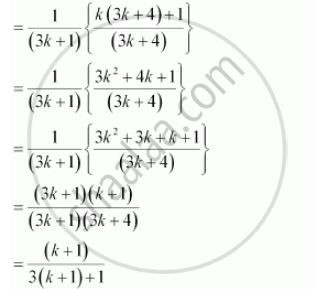Advertisements
Advertisements
प्रश्न
Prove the following by using the principle of mathematical induction for all n ∈ N:
`1/1.4 + 1/4.7 + 1/7.10 + ... + 1/((3n - 2)(3n + 1)) = n/((3n + 1))`
उत्तर
Let the given statement be P(n), i.e.,


Thus, P(k + 1) is true whenever P(k) is true.
Hence, by the principle of mathematical induction, statement P(n) is true for all natural numbers i.e., n.
APPEARS IN
संबंधित प्रश्न
Prove the following by using the principle of mathematical induction for all n ∈ N:
Prove the following by using the principle of mathematical induction for all n ∈ N:
Prove the following by using the principle of mathematical induction for all n ∈ N:
(1+3/1)(1+ 5/4)(1+7/9)...`(1 + ((2n + 1))/n^2) = (n + 1)^2`
Prove the following by using the principle of mathematical induction for all n ∈ N: 32n + 2 – 8n– 9 is divisible by 8.
12 + 22 + 32 + ... + n2 =\[\frac{n(n + 1)(2n + 1)}{6}\] .
1 + 3 + 32 + ... + 3n−1 = \[\frac{3^n - 1}{2}\]
\[\frac{1}{1 . 2} + \frac{1}{2 . 3} + \frac{1}{3 . 4} + . . . + \frac{1}{n(n + 1)} = \frac{n}{n + 1}\]
\[\frac{1}{1 . 4} + \frac{1}{4 . 7} + \frac{1}{7 . 10} + . . . + \frac{1}{(3n - 2)(3n + 1)} = \frac{n}{3n + 1}\]
2 + 5 + 8 + 11 + ... + (3n − 1) = \[\frac{1}{2}n(3n + 1)\]
1.3 + 2.4 + 3.5 + ... + n. (n + 2) = \[\frac{1}{6}n(n + 1)(2n + 7)\]
(ab)n = anbn for all n ∈ N.
n(n + 1) (n + 5) is a multiple of 3 for all n ∈ N.
11n+2 + 122n+1 is divisible by 133 for all n ∈ N.
Given \[a_1 = \frac{1}{2}\left( a_0 + \frac{A}{a_0} \right), a_2 = \frac{1}{2}\left( a_1 + \frac{A}{a_1} \right) \text{ and } a_{n + 1} = \frac{1}{2}\left( a_n + \frac{A}{a_n} \right)\] for n ≥ 2, where a > 0, A > 0.
Prove that \[\frac{a_n - \sqrt{A}}{a_n + \sqrt{A}} = \left( \frac{a_1 - \sqrt{A}}{a_1 + \sqrt{A}} \right) 2^{n - 1}\]
\[\frac{(2n)!}{2^{2n} (n! )^2} \leq \frac{1}{\sqrt{3n + 1}}\] for all n ∈ N .
Show by the Principle of Mathematical induction that the sum Sn of then terms of the series \[1^2 + 2 \times 2^2 + 3^2 + 2 \times 4^2 + 5^2 + 2 \times 6^2 + 7^2 + . . .\] is given by \[S_n = \binom{\frac{n \left( n + 1 \right)^2}{2}, \text{ if n is even} }{\frac{n^2 \left( n + 1 \right)}{2}, \text{ if n is odd } }\]
Prove that the number of subsets of a set containing n distinct elements is 2n, for all n \[\in\] N .
\[\text{ A sequence } x_0 , x_1 , x_2 , x_3 , . . . \text{ is defined by letting } x_0 = 5 and x_k = 4 + x_{k - 1}\text{ for all natural number k . } \]
\[\text{ Show that } x_n = 5 + 4n \text{ for all n } \in N \text{ using mathematical induction .} \]
Prove by method of induction, for all n ∈ N:
1.3 + 3.5 + 5.7 + ..... to n terms = `"n"/3(4"n"^2 + 6"n" - 1)`
Answer the following:
Prove, by method of induction, for all n ∈ N
8 + 17 + 26 + … + (9n – 1) = `"n"/2(9"n" + 7)`
Prove statement by using the Principle of Mathematical Induction for all n ∈ N, that:
1 + 3 + 5 + ... + (2n – 1) = n2
Prove statement by using the Principle of Mathematical Induction for all n ∈ N, that:
`sum_(t = 1)^(n - 1) t(t + 1) = (n(n - 1)(n + 1))/3`, for all natural numbers n ≥ 2.
Prove statement by using the Principle of Mathematical Induction for all n ∈ N, that:
2n + 1 < 2n, for all natual numbers n ≥ 3.
Prove by induction that for all natural number n sinα + sin(α + β) + sin(α + 2β)+ ... + sin(α + (n – 1)β) = `(sin (alpha + (n - 1)/2 beta)sin((nbeta)/2))/(sin(beta/2))`
State whether the following proof (by mathematical induction) is true or false for the statement.
P(n): 12 + 22 + ... + n2 = `(n(n + 1) (2n + 1))/6`
Proof By the Principle of Mathematical induction, P(n) is true for n = 1,
12 = 1 = `(1(1 + 1)(2*1 + 1))/6`. Again for some k ≥ 1, k2 = `(k(k + 1)(2k + 1))/6`. Now we prove that
(k + 1)2 = `((k + 1)((k + 1) + 1)(2(k + 1) + 1))/6`
Prove the statement by using the Principle of Mathematical Induction:
n3 – 7n + 3 is divisible by 3, for all natural numbers n.
Prove the statement by using the Principle of Mathematical Induction:
For any natural number n, 7n – 2n is divisible by 5.
Prove the statement by using the Principle of Mathematical Induction:
n3 – n is divisible by 6, for each natural number n ≥ 2.
Prove the statement by using the Principle of Mathematical Induction:
1 + 5 + 9 + ... + (4n – 3) = n(2n – 1) for all natural numbers n.
A sequence b0, b1, b2 ... is defined by letting b0 = 5 and bk = 4 + bk – 1 for all natural numbers k. Show that bn = 5 + 4n for all natural number n using mathematical induction.
Prove that, cosθ cos2θ cos22θ ... cos2n–1θ = `(sin 2^n theta)/(2^n sin theta)`, for all n ∈ N.
If xn – 1 is divisible by x – k, then the least positive integral value of k is ______.
